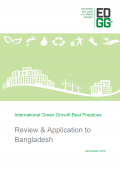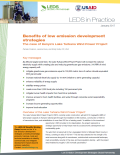
Access to modern energy is vital for sustainable development. In rural areas, decentralized energy solutions may play a significant role in reducing poverty, supporting community institutions and facilitating the generation of basic services such as communication, water access, education and health services. However, the majority of dwellers in off-grid communities...

This report examines the green growth potential and identifies best practices for policy and governance as well as ways to strengthen current practices. As the third largest city in Vietnam, Hai Phong’s economy is growing remarkably at an average rate of 8.7% (2015) in tandem with the growth of the...

Bandung Metropolitan Area (BMA) is home to 8.6 million people and is Indonesia’s second-largest urban agglomeration. Rapid growth has created a number of challenges for the city, including traffic congestion, air pollution, municipal solid waste and water access and management. The BMA also faces several acute disaster risks primarily related...

This report studies green growth trends, challenges and opportunities in the City of Stockholm, Sweden. It first analyses socio-economic trends and the environmental performance of the city and the county of Stockholm; then it reviews urban policies for land use, transport, buildings, waste, energy and water that contribute to economic...

This report studies green growth trends, challenges and opportunities in the City of Kitakyushu, Japan. It firstly analyses socio-economic trends and the environmental performance of Kitakyushu; secondly reviews urban policies for land use, transport, buildings, waste, energy, water and industries that contribute to economic growth and reduce pressure on the...

This report analyses the economic and environmental performance of Thailand’s Bangkok Metropolitan Region (BMR), assesses its policies and governance practices that promote green growth, and provides recommendations to enhance its green growth potential. Green growth aims to safeguard the natural assets, resources and environmental services on which our well-being relies. Cities play...

This report seeks to document international best practices in adopting green growth strategies. It explores why some countries decide to pursue a green growth path and how they transition to such a pathway. For many countries, green growth presents an attractive opportunity to achieve poverty reduction, environmental protection, and economic...

Countries pursuing low-emission development strategies (LEDS) aim to grow their economy while reducing greenhouse gas emissions, increasing resilience to climate change impacts, and achieving social development and environmental goals. Kenya has developed policies that align with these LEDS outcomes.
Kenya’s single largest private investment in history is the Lake Turkana...

The Jordan Clean Energy Investment Policy Review is a country-specific application of the OECD Policy Guidance for Investment in Clean Energy Infrastructure. It aims to help Jordanian policy makers strengthen the enabling conditions for investment in renewable electricity generation in Jordan. The Policy Guidance is a non-prescriptive tool to help...

This report identifies key rangeland ecosystem service benefits (food, fuel, construction material, ground water, genetic diversity, climate regulation, recreation and spiritual inspiration) in southern Botswana’s Kgalagadi District. It assesses the costs and trade-offs associated with ecosystem service delivery under: i) communal grazing, ii) private cattle ranching, iii) game ranching and...
